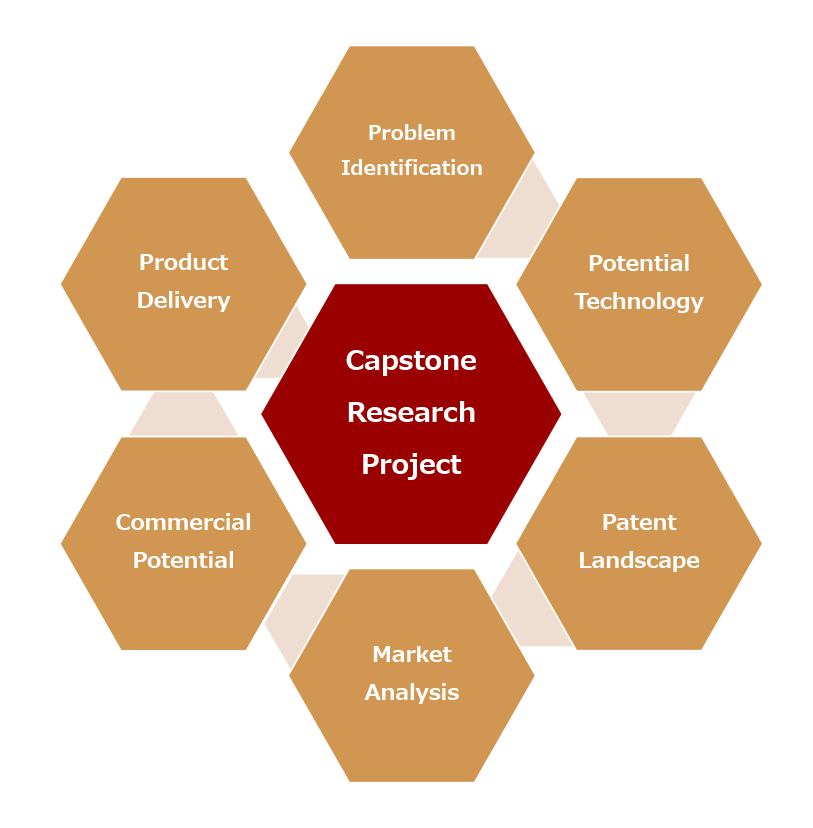Navigating Online MBA Capstone Projects: Applications for Professionals
Table of Contents

- jaro education
- 13, April 2024
- 10:00 am
As MBA students near the end of their academic journey, they face a challenging milestone: the capstone project. This marks the culmination of their learning, where they merge theoretical knowledge with real-world business intricacies. Unlike thesis projects that focus on theory, capstone projects dive into practical scenarios, testing students’ strategic thinking and decision-making abilities.
Capstone projects are not just about completing coursework; they provide an immersive experience akin to actual business challenges. Whether analyzing a company’s strategy, creating a startup plan, or simulating business scenarios, students tackle a range of hurdles to offer innovative solutions to real-world problems.
In this blog, you will get a comprehensive understanding of MBA capstone projects, discussing steps, challenges, examples, and their application for professionals.
Understanding MBA Capstone project
An MBA capstone project represents the culminating assignment that students undertake during the final year of their MBA. This project includes various scholarly activities aimed at helping students develop skills in information retrieval, analysis, and effective utilization. Capstone projects can take on diverse formats, such as multimedia presentations, films, performances, or written papers. Often likened to a college thesis, a capstone research project demands a higher level of complexity due to its requirement for critical thinking, in-depth analysis, and proficiency in utilizing different media forms.

*ms-biotech.wisc.edu
Applications and Benefits of Capstone Project for Professionals
The primary purpose of capstone projects is to foster students’ critical thinking, problem-solving, oral communication, research, and teamwork skills. Furthermore, these projects increase students’ engagement with their community, making them analyze significant issues, problems, and ideas. Some capstone tasks also involve extracurricular experiences, such as interviews and scientific observations. Some of the significant benefits of a capstone project include:
Preparation for the Working World
- Capstone projects merge theoretical learning with hands-on experience, shaping students into well-rounded graduates.
- Students collaborate in small groups to find creative solutions to real-world problems, gaining insights into the demands of the working world.
- This experience allows students to apply leadership and management skills in a supportive environment and understand the consequences of their decisions.
Enhanced CV and Job Prospects
- Undertaking a capstone project showcases to employers that you possess more than just basic academic qualifications.
- It demonstrates dedication, impressive skills, work ethic, and practical experience, making you stand out among job applicants.
- Completing a capstone project is a significant achievement that can be highlighted on your resume, emphasizing your communication, research, and project management abilities.
Valuable Practical Experience
- Individuals demonstrate practical experience, which employers highly value.
- A capstone project bridges the gap between theoretical knowledge and real-world application, proving your competence in both areas.
- The project challenges you to seek reliable information, conduct interviews, and gather field data, significantly enhancing your practical skills.
Development of Highly Valued Skills
- Capstone projects focus on developing specific skills highly sought after by employers.
- They improve critical thinking, decision-making, oral communication, and problem-solving skills through complex and challenging tasks.
- Each project contributes to skill refinement, preparing you for success in your career or further studies.
Overall Student Development
- Capstone projects symbolize the culmination of academic growth, preparing students for the workforce.
- These projects enhance various skills such as public speaking, teamwork, planning, and research, fostering holistic development.
- Students gain practical experience, explore diverse ideas, and utilize a range of learning methods, contributing to their overall growth and readiness for professional life.
MBA capstone projects can be easier if you have a team of like-minded professionals. The Online MBA Programme by Manipal University Jaipur fulfils this need. It equips you with the tools to enhance your industry expertise and connect with peers who share your ambition to lead in the future.
Guide to Perform MBA Capstone Project
Step-by-Step Guide for Capstone Project Success:
Choose Your Topic: Begin by selecting a topic area that interests you. Refer to the “Selecting and Focusing Your Research Topic” section for tips on narrowing down your focus and formulating a clear thesis statement or research question.
Conduct a Literature Review: Explore existing literature related to your topic. The “Literature Review” section provides valuable resources for planning your search and organizing the information you find. Use the “Start Searching” section for effective article database strategies.
Perform Primary Research (if required): Access resources in the “Doing Primary Research” section if your project requires primary research. Here, you’ll find guidance on creating surveys, locating tests, designing studies, and more.
Present Your Findings: Use the “Writing & Citing” resources to craft your paper, cite sources accurately, and avoid plagiarism. Additionally, the “Presentation Skills” section offers tips on creating compelling visual aids and delivering a professional presentation that effectively showcases your results.
Choosing the Right Topic for the Capstone project
Numerous MBA programs offer structured options for choosing a capstone topic. This may entail students selecting from a list of potential partnership opportunities or collaborating with faculty advisors to identify a topic aligning with their strengths, weaknesses, and objectives. Alternatively, some MBA programs grant students more autonomy in choosing both their topic and partner organization.
In their capstone project, MBA students are advised to choose a topic that addresses a meaningful and strategic business question—one that is sufficiently complex to necessitate substantial effort yet feasible to accomplish. These questions are not hypothetical; they are tailored to real-world business scenarios.
Examples of MBA capstone topics include:
- Developing a Market Entry Strategy for a Tech Startup: Evaluate the viability of expanding into a new market for a technology startup. Consider aspects such as the target demographic, competitive landscape, and regulatory framework.
- Conducting a Financial Performance Assessment for a Retail Chain: Examine a retail chain’s financial stability through an analysis of key financial metrics, profitability indicators, and liquidity ratios. Offer actionable recommendations to enhance performance.
- Creating Employee Engagement Programs for a Multinational Corporation: Devise and execute initiatives to boost employee satisfaction, productivity, and retention within a multinational enterprise. Focus on enhancing job satisfaction and fostering a positive work environment.
- Implementing Supply Chain Optimization for a Manufacturing Firm: Streamline inventory control, logistics, and production processes to minimize expenses and enhance operational efficiency for a manufacturing company.
The chosen capstone topic should directly relate to the partner company or organization. Therefore, MBA students are encouraged to conduct thorough research on the company’s strengths, weaknesses, and objectives before finalizing their topic.
Moreover, MBA students should introspectively consider the problems they wish to explore in their business careers, the causes that pique their interest, and how they can leverage their unique skill set effectively. This self-reflection ensures that the chosen capstone project aligns with their personal and professional aspirations.
Challenges in MBA Capstone Project
Online MBA capstone projects represent the culmination of an MBA program, blending academic knowledge with real-world business application; however, it is not challenge-free. Here are some common challenges encountered during these projects:
1. Virtual Collaboration and Communication
Distance Barrier
Online capstone teams often comprise members from different locations, posing challenges for synchronous collaboration.
Communication Tools Selection
Choosing suitable communication tools and ensuring consistent interaction can prove challenging.
2. Project Scope and Focus
Topic Selection
Students need to narrow down relevant and manageable topics within the given timeframe.
Balancing Depth and Breadth
Striking a balance between in-depth analysis and broad coverage can be tricky.
3. Time Management
Self-Discipline
Online learners must exhibit strong self-discipline to allocate time for research, analysis, and writing.
Scheduling Challenges
Coordinating team members’ schedules for meetings and collaborative work can be daunting.
4. Real-World Application
Theory Integration
Transforming theoretical knowledge into practical solutions for real companies can be a complex process.
Adapting to Business Context
Understanding and addressing the unique challenges faced by specific organizations requires adaptability.
5. Data Collection and Analysis
Data Accessibility
Online students may encounter limitations in accessing primary data or company-specific information.
Analytical Proficiency
Mastering data analysis tools and techniques is crucial for effective project execution.
6. Faculty Guidance and Feedback
Remote Interaction
Establishing a rapport with faculty members virtually differs from face-to-face interactions.
Timely Feedback
Waiting for feedback on drafts and revisions can affect project timelines and progress.
7. Balancing Academics and Work Commitments
Professional Responsibilities
Many online MBA students juggle full-time work commitments alongside capstone project demands.
Prioritization Skills
Effectively managing coursework, job duties, and capstone work necessitates efficient time management.
8. Technology Challenges
Software Adaptation
Students must adapt to various online platforms for research, collaboration, and document sharing.
Technical Issues
Connectivity disruptions or software glitches can hinder teamwork and project continuity.
Domains to choose for MBA capstone project
When considering a project for your MBA program, it’s essential to explore various topical domains that align with your interests and career goals. Here are some popular domains you can delve into for your project:
Marketing Management
Marketing management involves overseeing marketing functions to drive business growth. This domain covers areas such as marketing strategy formulation, digital and print marketing, brand management, consumer behavior, and marketing analysis.
Finance Management
Financial management focuses on optimizing finances in a business to maximize financial output and assets. It includes aspects like banking, investments, stock brokerage, insurance, and financial services.
Human Resource Management
Human resource management deals with managing processes related to human resources in an organization, including recruitment, training, performance appraisal, and grievance redressal.
Operations Management
Operations management aims to enhance organizational processes and performance. Areas of focus include operations strategy, quality management, supply chain management, inventory management, and service operations.
Project Management
Project management involves planning, executing, and evaluating projects to achieve specific goals. It covers project strategy, task allocation, supervision, and quality assurance.
Strategic Management and Entrepreneurship
This domain focuses on strategy formulation for organizations and entrepreneurship success. It includes studying effective entrepreneurship and strategizing for business growth.
Holistic Project Approach
Another approach is to explore management holistically by considering multiple perspectives. This approach is beneficial for conducting comprehensive case studies or understanding management across domains for a particular organization.
Ideas for MBA Capstone Projects
Comparative Analysis of Investment Options in India
A compelling project in the realm of financial management and investments involves delving into the popularity of various investment options within India. This exploration can offer insights into evolving trends regarding these options. Investment avenues in India encompass diverse choices such as gold purchases, stock investments, mutual funds, cryptocurrencies, and more, all pivotal in the Indian investment landscape.
Some of these options have garnered significant attention in recent times, while others remain traditionally popular. Your project could include a comprehensive analysis that examines year-wise trends in popularity and regional variations in popularity, as well as conducting surveys to understand the perceived advantages and disadvantages of each option.
Advancements in Total Quality Management in the Private Sector
Within the domain of operations management, Total Quality Management (TQM) stands as a pivotal approach to quality assurance within organizations. TQM involves gathering data from various sources, levels, modes, and stages across the production chain to ensure quality. Despite its recognition as an effective quality management method, its full integration into organizational ecosystems, particularly in the private sector, remains incomplete in many cases. Thus, a project exploring TQM adoption in private-sector organizations can shed light on how this approach is evolving. Moreover, with the advent of technologies like Artificial Intelligence (AI) and Machine Learning (ML), there are new and innovative developments shaping the TQM landscape, making it an intriguing area of exploration for students.
Case Studies of Influential Female Leaders and CEOs in India
One significant area frequently explored in management studies, particularly within domains such as Human Resource Management (HRM) and entrepreneurship, is leadership. Delving into the experiences of female leaders can present an intriguing project opportunity. Through a case study, students can delve into various dimensions such as leadership and management styles, contextual factors influencing leadership effectiveness, the impact of leadership on company success, subordinates’ satisfaction with the leader, decision-making strategies employed by female leaders, and the challenges faced in leadership roles as a woman. This type of case study can serve as a valuable addition to a student’s resume and portfolio, addressing a socially relevant topic within the realm of management.
Conclusion
The capstone project stands out as an innovative alternative to the traditional MBA mini-dissertation, offering a unique skill-building opportunity that directly prepares you for the challenges of the evolving work landscape. Through this activity, you not only enhance your resourcefulness but also sharpen your critical thinking abilities and nurture crucial leadership skills.
Moreover, the capstone project plays a pivotal role in providing clarity regarding your career trajectory. It serves as a roadmap, guiding you toward your desired professional destination and helping you make informed decisions about your future endeavors.









